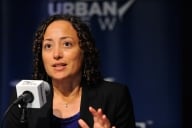You have /5 articles left.
Sign up for a free account or log in.
Today, you need to know a little bit of everything, But Villanova University's undergraduate business school curriculum, starting this fall, is designed on the theory that you don't need an individual course in everything.
James Danko, Villanova's business dean, said the “fundamental root” of the new curriculum is to have a multidisciplinary perspective. Several courses that used to be taught stand alone will be integrated into one course. For example, the introductory courses in finance and in accounting, which used to be two separate courses, will become one. The new course, financial management and reporting, will be six credits and taught by two instructors.
Walter Tymon, associate professor of management, explained another new course, in business dynamics, will also be taught over two semesters. It was created by a team of professors from accounting, business law, finance, information systems, management and marketing. Faculty members from these areas will each teach a section. The first semester will focus on giving students a "context for studying business." Questions the course will cover include: "What is business and how does a business create value? Who are the various stakeholders in a business and how do they, and should they, influence decision-making? How has business evolved, and what are the important issues associated with the global business environment, ethics, leadership, teams, communication, motivation, and the structure and culture of companies."
The second semester will focus on concepts from "each functional area of business with an emphasis on integration and how each discipline is part of a total system to achieve a business mission."
Building on the growing trend of colleges requiring new students to read a common book before they enroll, Villanova is having its new business majors read Pour Your Heart into It: How Starbucks Built a Company One Cup at a Time, over the summer prior to beginning the course. Students will discuss the book in the business dynamics course, and in small groups led by business executives who graduated from Villanova's Executive M.B.A. program.
“That’s going to be taught from a broader perspective,” Danko said.
Also, instead of having separate courses about skills such as communication or technology, Danko said there will be an emphasis in these skills being taught throughout the curriculum.
The changes came about in attempt to respond to the current business world, Danko said. The current curriculum has not had a significant overhaul since the 1950s and is based on an economic model that is no longer applicable into today’s world, he said.
Tymon, who was on the faculty committee that looked at curriculum revision, said that one of the factors that led to the change was “the fact that we do have a global economy.” He also mentioned students need to be able to see the “big picture” and the intent behind it, which means they need to have knowledge across the disciplines of business. “Students really need to be able to integrate across functions,” he said.
Danko said 85 percent of the faculty voted in favor of the proposed changes.
John J. Fernandes, president and chief executive officer of AACSB International: The Association to Advance Collegiate Schools of Business, said an integrative curriculum like the one Villanova will be using is increasingly common.
“It’s definitely the wave of the future to build an integrated curriculum,” he said.
In addition to the new curriculum, there have also been changes in how the faculty and departments have been structured. When Danko became dean three years ago, he proposed a new organization, which included compressing some departments and opening new ones. Operations management was merged with management and strategy. The economics department became economics and statistics. Accounting and management information merged to make accounting and information systems. In addition, Danko said he made "trial departments" called strategic initiative groups. Professors were offered the chance to take a "leave of absence" from their own department to join these groups. Some of these groups have focused on course development while others have focused on research. He said he encouraged the faculty to work in a “multidisciplinary way.” This faculty reorganization became a precursor to the change in curriculum.
Although most business schools don’t follow this model, Fernandes said he thinks that will change in the future because the traditional model is not sustainable, and more business schools will rethink structures.
“They’re going to have to, personally I think they should, but they’re going to have to,” he said.
Johns Hopkins School of Business is going even further than Villanova in its approach to faculty organization. The school, which only opened in 2007, will have no departments, beginning July of this year, said Yash Gupta, the dean. All professors will be encouraged to be part of multidisciplinary centers for research. But Gupta said that departments aren't needed.
“Business decisions are integrative,” he said.








